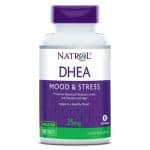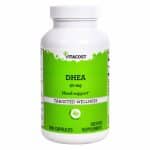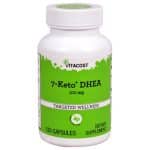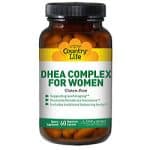Osteoporosis (fragility of the bones) affects millions of individuals of both sexes from their forties, but is more common in women than in men. In women, the main factor in this medical condition is the decrease in estrogen during menopause, which is simultaneous with the decline in the production of DHEA. It seems that DHEA exerts a positive role on bone metabolism by inhibiting bone loss and stimulating the growth of bone tissue. It also appears to improve calcium absorption. DHEA has been shown to be effective in clinical trials for the treatment of osteoporosis. However, the correlation between DHEA and the mineral density of the bones, manifests itself in a variable way in women, and not at all in men.
Clinical studies
- Study carried out by the Department of Gerontology of the Sixth People's Hospital of Shanghai, China. In order to study the effects of treatment of osteoporosis with DHEA sulphate (DHEAS) in men with a bone mineral density index greater than or equal to 2.5 (i.e. 2.5 times lower than the average for a man aged 30 years), 86 patients were randomly divided into 2 groups. A group who took the treatment (44 people) and a control group (42 people). The treatment group was given 100 mg per day of DHEAS for 6 months. Bone mineral density, biochemical markers of bone absorption and formation, and other biochemical markers were measured before and after DHEAS supplement treatment. Side effects of treatment were also assessed. After oral administration of 100 mg of DHEAS for 6 months, serum concentrations of DHEAS and Insulin-Like Growth Factor (IGH-1), were 93.75% (+/- 16.1% higher, respectively). than it was in the control group) and 17.71% (+/- 4.2% higher than it was in the control group). The bone mineral density of the 2nd, 3rd, 4th, 5th lumbar and neck section increased for the treated group, respectively by 2.65% (+/- 0.65% more than the control group), 2.70% (+ /- 0.48% more than the control group), 3.10% (+/- 0.41% more than the control group), 2.82% (+/- 0.37% more than the control group) and 2.32% (+/- 0.31% more than the control group). No significant change was observed in the concentration of "Free" Testosterone (FT), Estradiol (E2) and Prostate Specific Antigen (PSA) in the serum of the treated group compared to that of the control group. DHEAS treatment of osteoporosis in men appears to be effective and safe.




